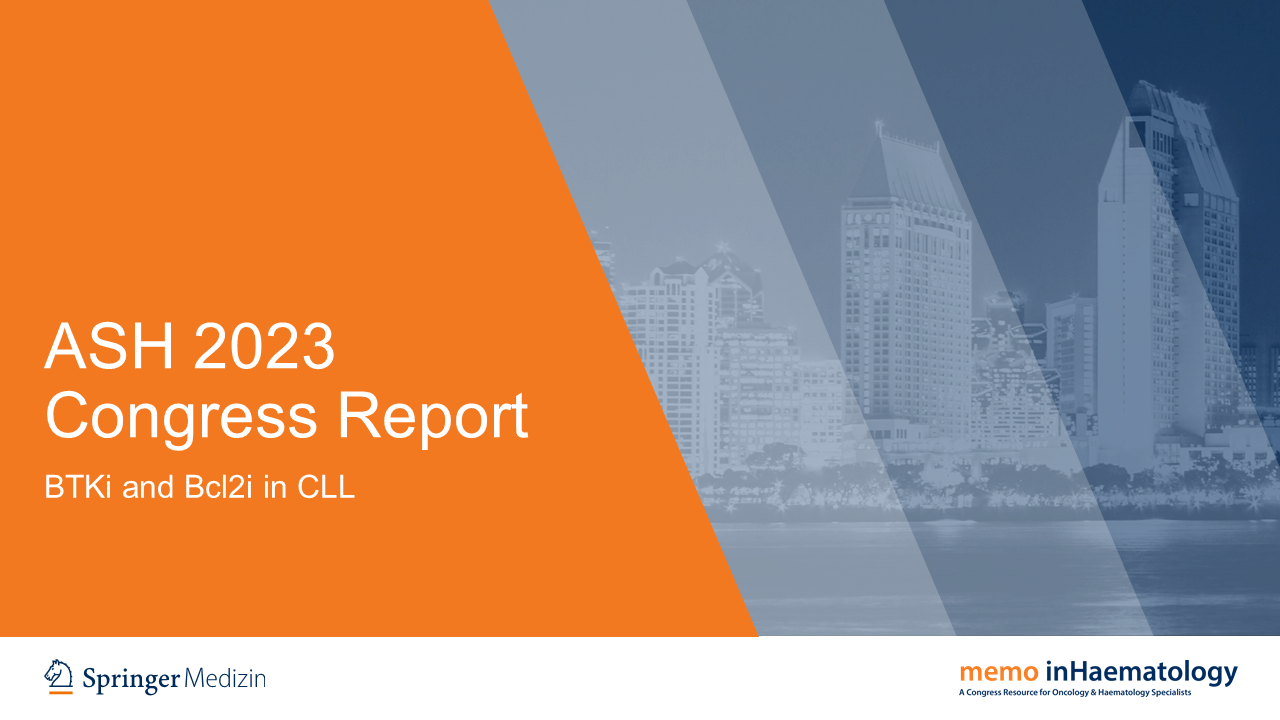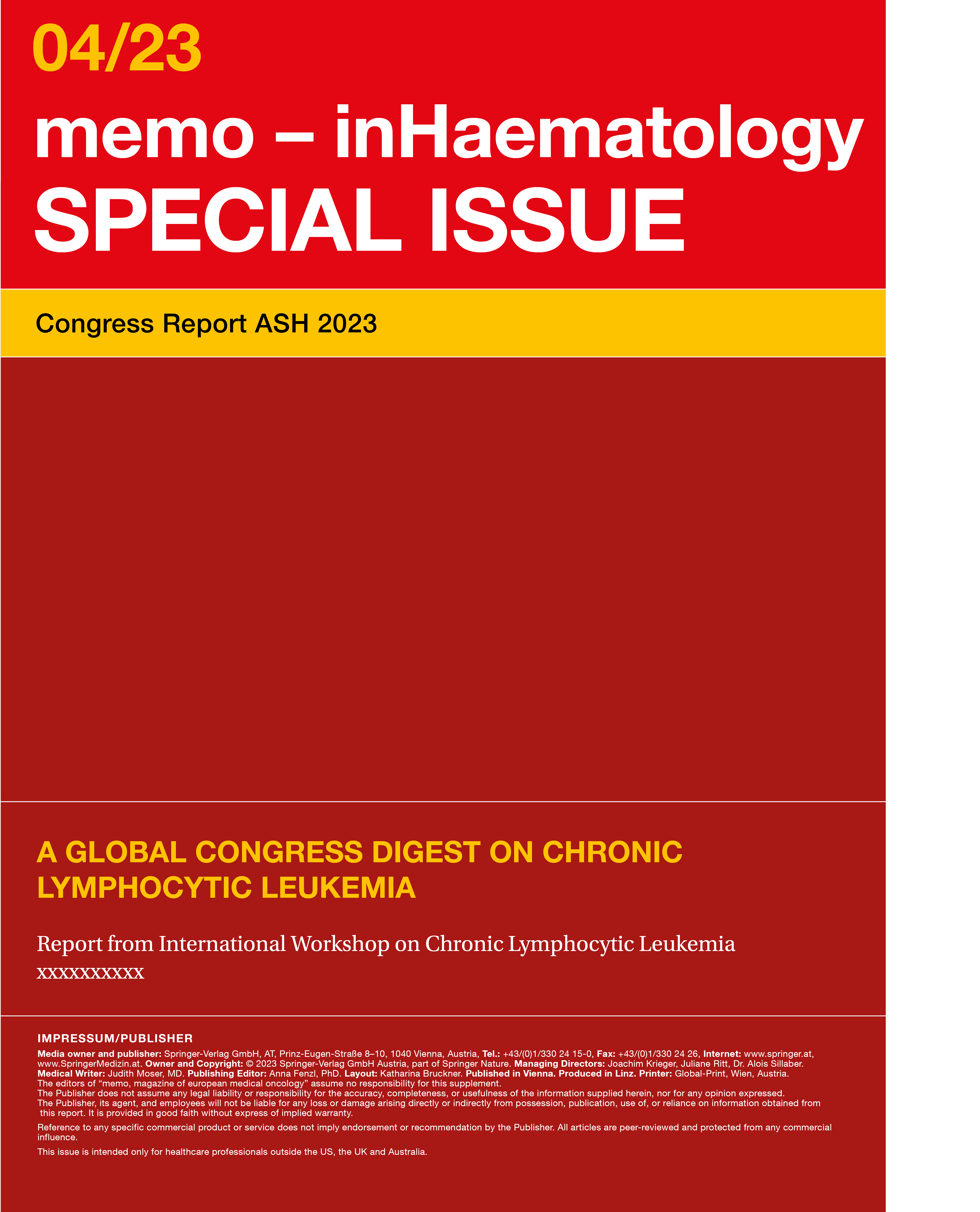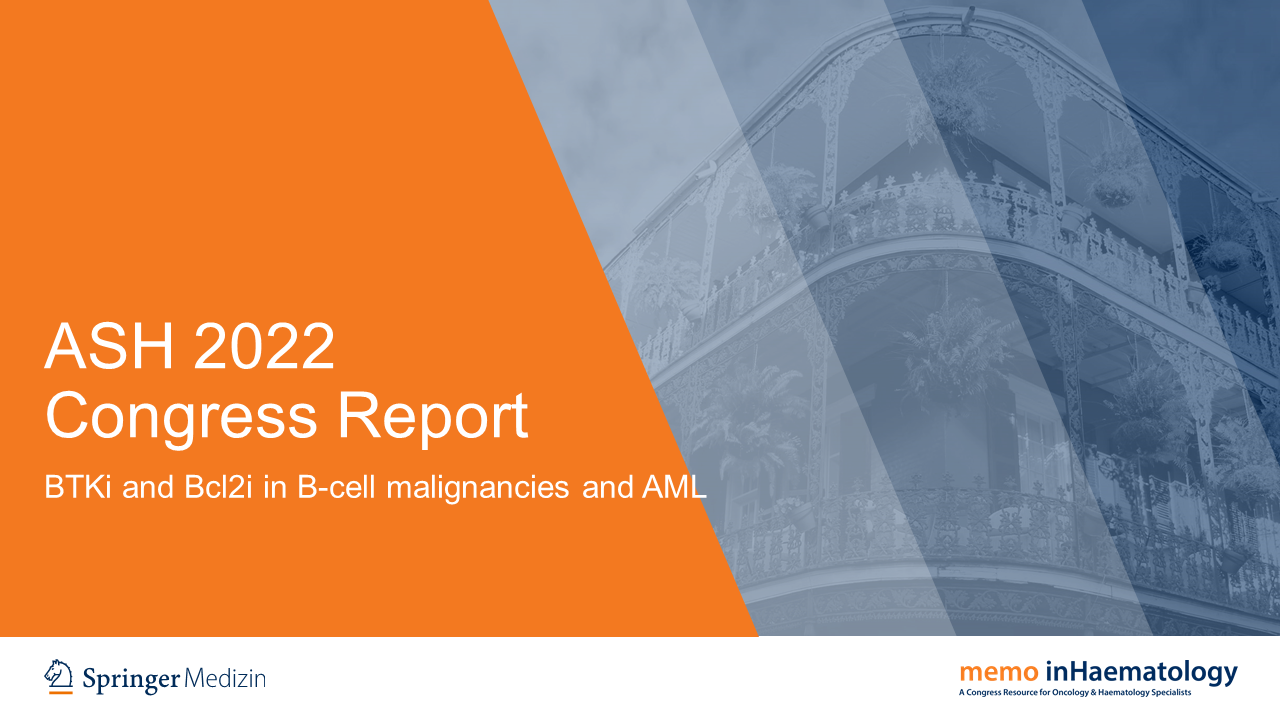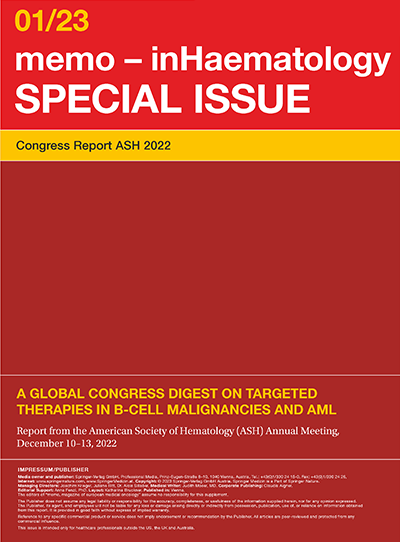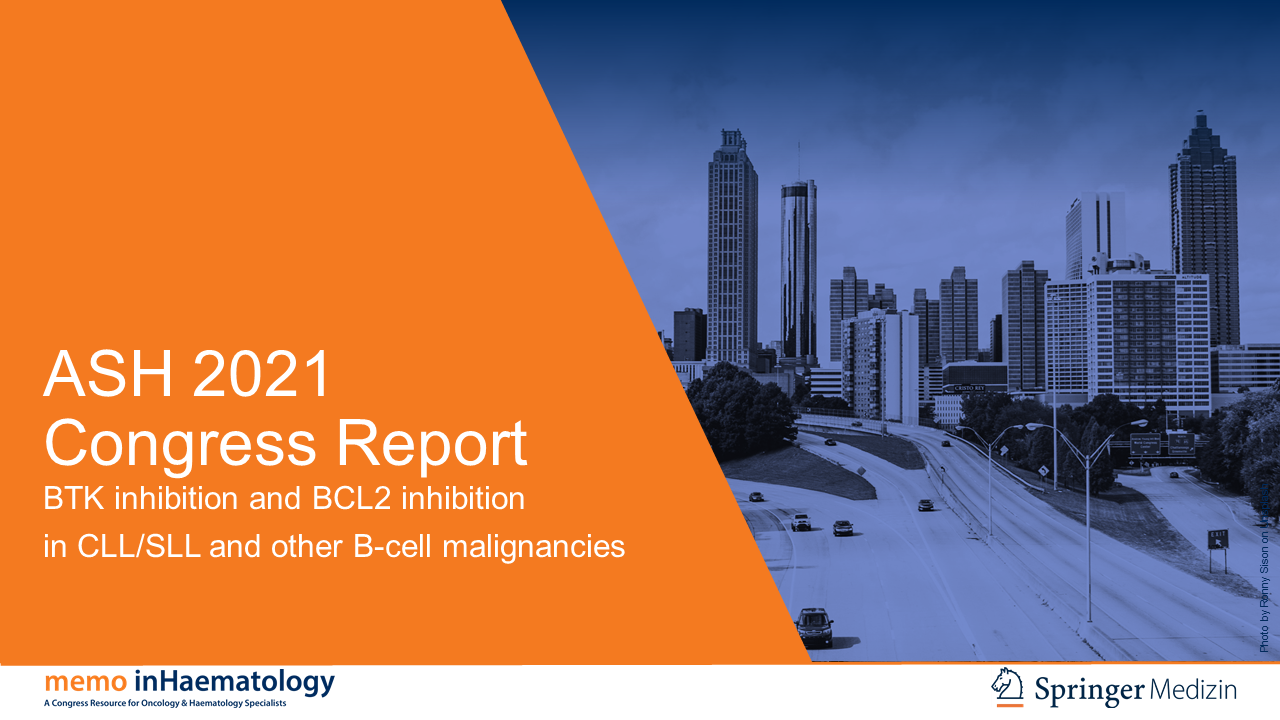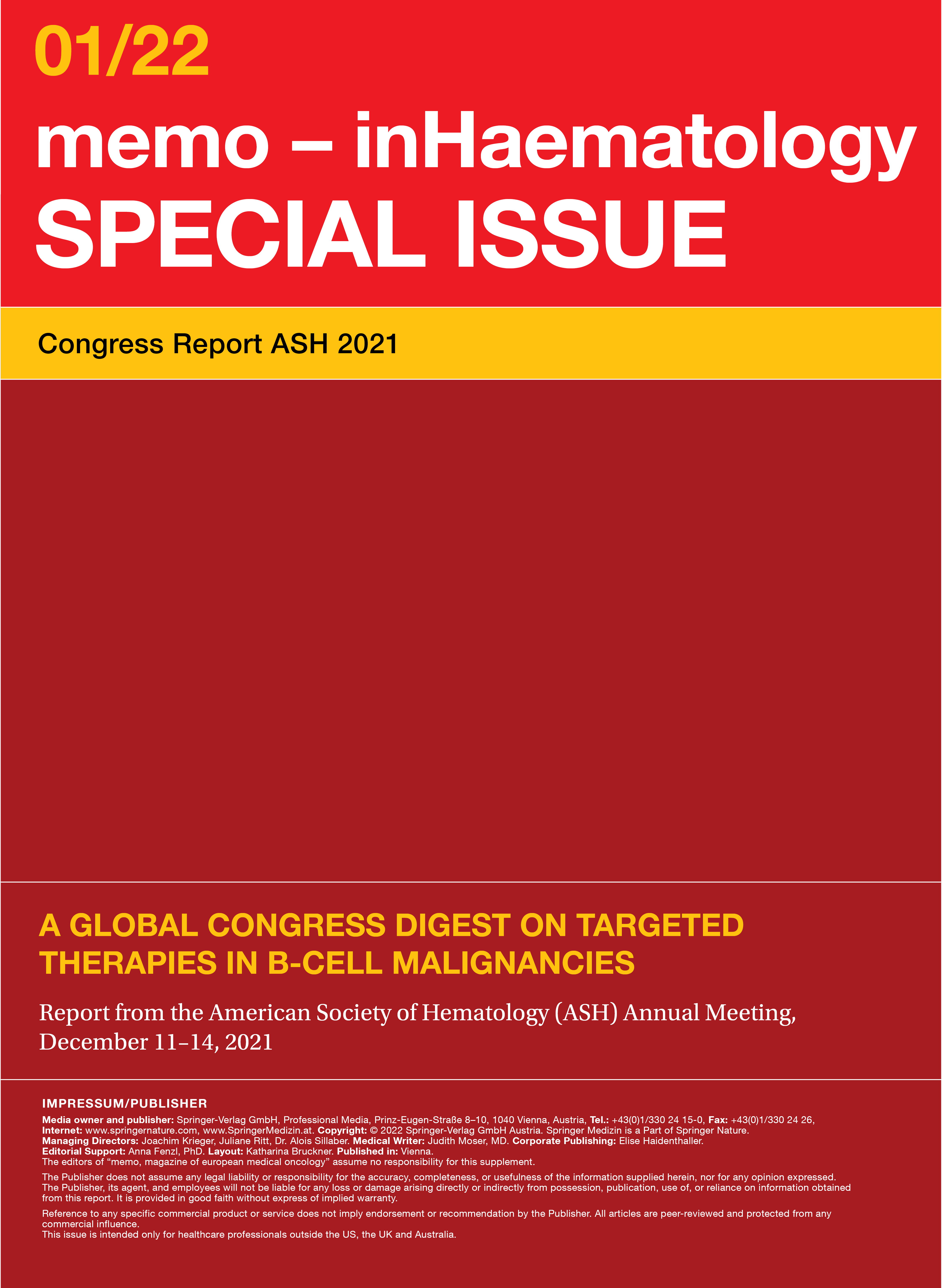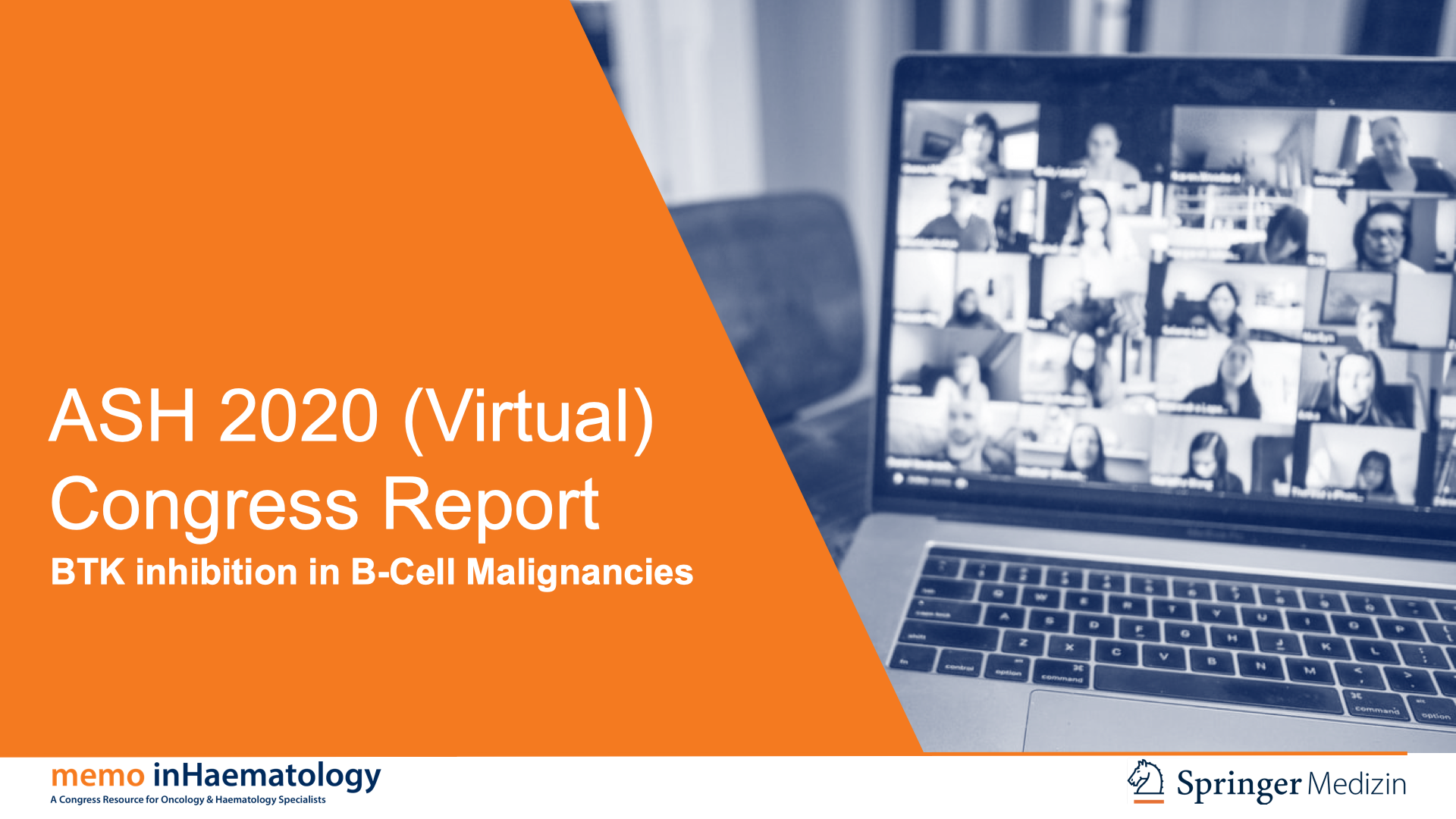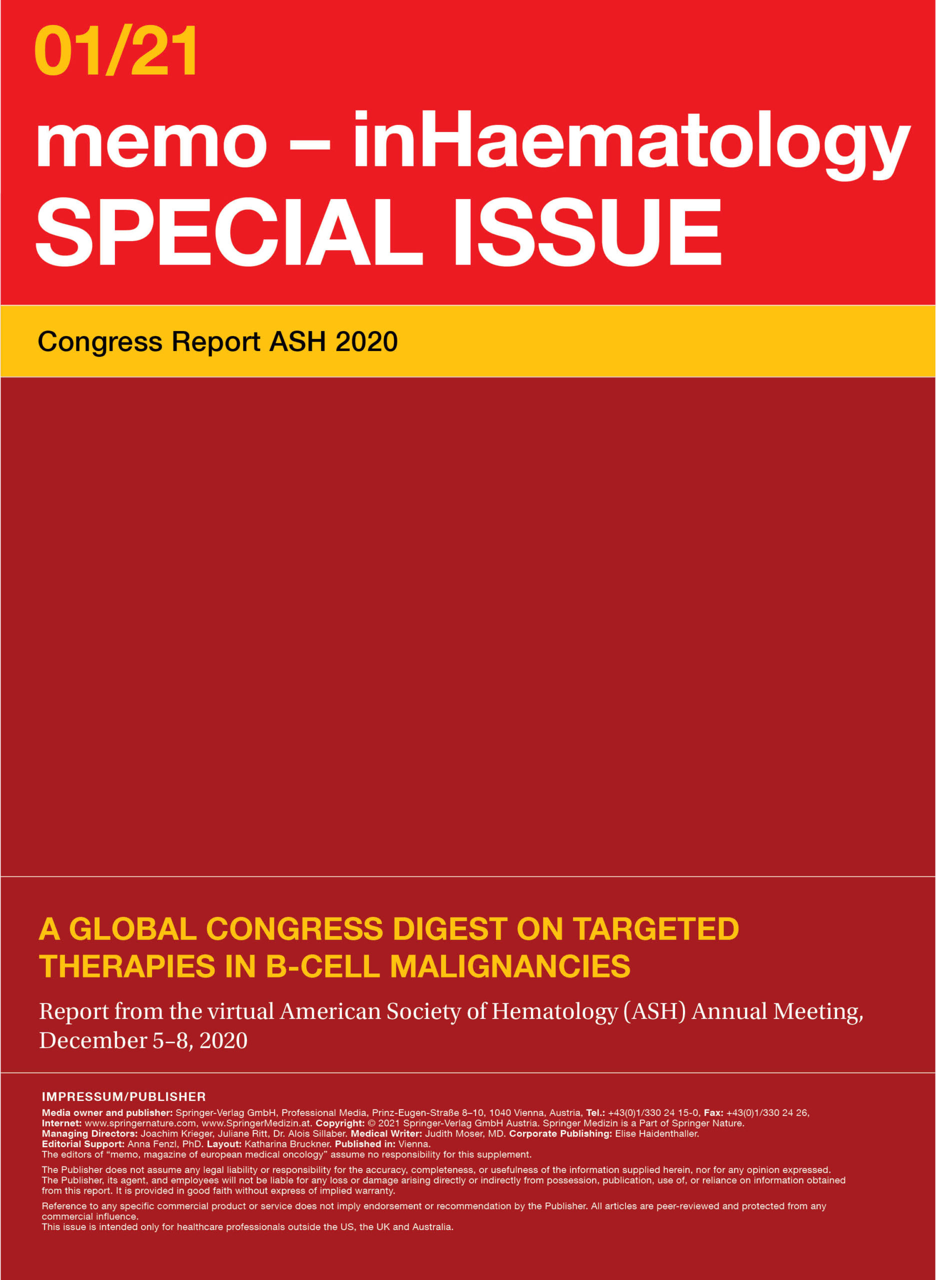ASH 2023 – hybrid
Lecture Board: Othman Al-Sawaf, MD; Jorge J. Castillo, MD; Chan Cheah, MD; Francesca M. Gay, MD, PhD; Anath C. Lionel, MD, PhD; Paolo Strati, MD; Jason Westin, MD
Medical Writer: Judith Moser, MD
Publishing Editor: Anna Fenzl, PhD
Preface – ASH 2023
Preface – ASH 2023 © private – Moritz Fürstenau, MD, German CLL Study Group, University of Cologne, Cologne, Germany Dear Colleagues, The 65th Annual Meeting of the American Society of Hematology (ASH) took place as a hybrid event that hosted participants both online and on-site in San Diego, California, USA.
Mantle cell lymphoma: emerging treatment regimens and new standards
Mantle cell lymphoma: emerging treatment regimens and new standards SYMPATICO: venetoclax plus ibrutinib Based on promising results of early-phase studies, the multinational, double-blind, placebo-controlled phase III SYMPATICO trial is evaluating the concurrent administration of the BTK inhibitor ibrutinib and the Bcl-2 inhibitor venetoclax in the setting of relapsed/refractory mantle cell lymphoma (MCL) [1, 2].
Waldenström macroglobulinemia: optimizing outcomes in the first and later lines
Waldenström macroglobulinemia: optimizing outcomes in the first and later lines Effects of transition from ibrutinib to zanubrutinib The randomized phase III ASPEN study compared the next-generation BTK inhibitor zanubrutinib with ibrutinib in patients with symptomatic, MYD88-mutated Waldenström macroglobulinemia (WM), demonstrating a trend towards better response quality and decreased toxicity in the zanubrutinib arm [1].
Improving responses in multiple myeloma
Improving responses in multiple myeloma PERSEUS: D-VRd vs. VRd An established treatment approach for transplant-eligible patients with newly diagnosed multiple myeloma (MM) is induction treatment with bortezomib, lenalidomide and dexamethasone (VRd) followed by autologous stem cell transplantation (ASCT), VRd consolidation, and lenalidomide maintenance.
Follicular lymphoma: BTK inhibition and bispecific antibodies
Follicular lymphoma: BTK inhibition and bispecific antibodies Acalabrutinib in addition to lenalidomide/rituximab With respect to the treatment of newly diagnosed follicular lymphoma (FL), there is room for improvement as many patients relapse after first-line chemoimmunotherapy. The frontline use of lenalidomide and rituximab (R2) has proven highly active in patients with FL [1, 2].
Updated findings in CLL with a focus on BTK- and Bcl-2–targeted therapies
Updated findings in CLL with a focus on BTK- and Bcl-2–targeted therapies Treatment-naïve disease Ibrutinib/venetoclax vs. FCR in FLAIR Personalization of treatment duration of ibrutinib plus venetoclax using measurable residual disease (MRD) was explored in fit patients with previously untreated chronic lymphocytic leukemia (CLL) in the multicenter, randomized, open-label, phase III FLAIR trial.
Exploring chemotherapy-free approaches in the treatment of DLBCL
Exploring chemotherapy-free approaches in the treatment of DLBCL Smart Stop: quadruplet therapy For decades, the CHOP regimen has been the first-line standard of care for patients with newly diagnosed diffuse large B-cell lymphoma (DLBCL). Significant improvement was achieved through the addition of rituximab (R-CHOP).
Innovative agents in marginal zone lymphoma and other B-cell malignancies
Innovative agents in marginal zone lymphoma and other B-cell malignancies Relapsed/refractory MZL: sonrotoclax Relapses are common in patients with marginal zone lymphoma (MZL), and sequential therapy is often necessary.
EXPERT VIDEOS
All video interviews from ASH 2023
Barbara F. Eichhorst describes possible approaches to improve the early detection of molecular CLL relapses, discusses venetoclax-based first-line combinations in CLL, and rates the relative efficacy and safety of different BTK inhibitors in relapsed/refractory CLL while finally sharing her personal highlights from the ASH 2023 congress.
Ramón García-Sanz gives insights into the assessment of residual disease in multiple myeloma and explains future clinical implications of these data. Moreover, he discusses in which ways the evaluation of minimal residual disease might improve the management of patients with Waldenström macroglobulinemia and shares his personal highlight from the ASH 2023 congress.
Stephan Stilgenbauer discusses the current evidence regarding the treatment of Richter transformation with modern agents and reviews the findings of the RT1 trial presented at the ASH 2023 meeting. Finally, he highlights future combinations of novel agents like adding the next-generation BCL-2 inhibitor sonrotoclax to tislelizumab plus zanubrutinib which will be investigated in the amendment of the RT1 trial or the use of the non-covalent BTK inhibitor pirtobrutinib combined with epcoritamab, a bispecific antibody, that will be in the focus of the international RT2 trial.
ASH 2022 – hybrid
Lecture Board: Othman Al-Sawaf, MD; Chan Cheah, DMSc; Alex F. Herrera, MD; Elisabeth Koller, MD; Constantine Tam, MBBS, MD; Stefan Vogt, MD; Michael Wang, MD; Moshe Yair Levy, MD
Medical Writer: Judith Moser, MD
Publishing Editor: Anna Fenzl, PhD
Preface – ASH 2022
Preface – ASH 2022 © Lebens.Med Zentrum Bad Erlach - Stefan Vogt, MD, Lebens.Med Zentrum Bad Erlach, Department of Oncological Rehabilitation, Austria Dear Colleagues, The 64th Annual Meeting of the American Society of Hematology (ASH) took place as a hybrid event that hosted participants both online and on-site in New Orleans, Louisiana, USA. Among the multitude of updates and new insights presented from December 10th to 13th, 2022, attendees had access to thousands of scientific abstract
Potential strategies to overcome relapsed and refractory Waldenström’s macroglobulinemia
Potential strategies to overcome relapsed and refractory Waldenström’s macroglobulinemia Although covalent BTK inhibitors are increasingly important in the management of patients with Waldenström’s macroglobulinemia (WM), progression and intolerance frequently necessitate treatment discontinuation. In the relapsed/refractory setting, the therapeutic options following chemoimmunotherapy and covalent BTK inhibitor therapy are limited, with no accepted standard of care [1, 2]. Non-covalent BTK
Active monotherapies and combinations in mantle cell lymphoma
Active monotherapies and combinations in mantle cell lymphoma First-line triple combination: ALR The initial treatment of patients with mantle-cell lymphoma (MCL) is continuously evolving due to the introduction of new targeted agents. Ruan et al. conducted a single-arm phase II study based on the hypothesis that the addition of the next-generation BTK inhibitor acalabrutinib to lenalidomide plus rituximab (ALR) would synergize activity and accelerate minimal residual disease (MRD)-negative
Further steps to improve efficacy and safety in acute myeloid leukemia
Further steps to improve efficacy and safety in acute myeloid leukemia Long-term follow-up of VIALE-A Venetoclax 400 mg QD in combination with azacitidine 75 mg/m2 on days 1–7 has been approved for the treatment of patients with newly diagnosed acute myeloid leukemia (AML) who are ineligible for intensive chemotherapy based on the phase III VIALE-A trial that met its primary endpoint of overall survival (OS) at the time of the interim analysis conducted in March 2020 [1]. The study included
Chronic lymphocytic leukemia: moving towards new horizons
Chronic lymphocytic leukemia: moving towards new horizons Final analysis of ALPINE: zanubrutinib vs. ibrutinib The first-in-class, covalent BTK inhibitor ibrutinib has transformed the treatment of patients with chronic lymphocytic leukemia (CLL) and small lymphocytic lymphoma (SLL). However, toxicities frequently lead to treatment discontinuation [1-4]. Moreover, exposure coverage between dosing intervals falls below the IC50 threshold, and BTK occupancy at trough levels is variable [5]. The
New approaches in relapsed and refractory DLBCL
New approaches in relapsed and refractory DLBCL Polatuzumab vedotin plus R-ICE Approximately one third of patients with diffuse large B-cell lymphoma (DLBCL) develop relapsed or refractory disease, which remains a major cause of mortality [1]. In patients relapsing more than 1 year after first-line treatment, the standard of care is salvage treatment followed by autologous stem cell transplantation (ASCT), although responses to platinum-based salvage therapy are generally suboptimal. The CD7
Follicular lymphoma: bispecific and PI3Kδ-targeted approaches
Follicular lymphoma: bispecific and PI3Kδ-targeted approaches Advanced-stage follicular lymphoma (FL) remains incurable, with most patients eventually experiencing disease progression despite therapeutic advances. Relapsed or refractory FL is challenging to treat, particularly in high-risk patients who are refractory to prior treatments and have progressed within 24 months. The combination of rituximab and lenalidomide (R2) is commonly used in this setting, although complete response (CR) rat
Clinical findings with sundry targets in various B-cell malignancies
Clinical findings with sundry targets in various B-cell malignancies AUGMENT: 5-year results Recurrent follicular lymphoma (FL) and marginal zone lymphoma (MZL) are treated similarly, mostly with single-agent rituximab. In patients with relapsed/refractory FL, the combination of lenalidomide with rituximab (R2) has previously demonstrated promising efficacy [1]. The multicenter, double-blind, randomized, phase III AUGMENT study was initiated to compare time-limited treatment for approximatel
Final analysis of the MAGNOLIA trial: zanubrutinib in marginal zone lymphoma
Final analysis of the MAGNOLIA trial: zanubrutinib in marginal zone lymphoma The global, open-label, single-arm, phase II MAGNOLIA trial was designed to assess the next-generation BTK inhibitor zanubrutinib in patients with relapsed/refractory marginal zone lymphoma (MZL) who had previously received ≥ 1 CD20-directed regimen. After a median follow-up of 15.7 months, the overall response rate (ORR) according to independent review was 68.2 %, with complete remissions resulting in 25.8 % [1]. M
EXPERT VIDEOS
All video interviews from ASH 2022
Shirley D’Sa discusses the results of the first clinical trial investigating checkpoint inhibition in relapsed/refractory Waldenström’s macroglobulinemia as well as other immunotherapeutic agents or combinations that might be worth investigating in this setting and explains the association of type I cryoglobulinemia with WM, IgM monoclonal gammopathy of undetermined significance or non-Hodgkin Lymphoma.
ASH 2021 – virtual
Lecture Board: Othman Al-Sawaf, MD; Jorge J. Castillo, MD; Wojciech Jurczak, MD, PhD; Amitkumar Mehta, MD
Publishing Editor: Anna Fenzl, PhD
Preface
Preface – ASH 2021 Amitkumar Mehta, MD, Division of Hematology and Oncology, University of Alabama at Birmingham, USA Dear Colleagues, The 63rd Annual Meeting of the American Society of Hematology (ASH) took place as a hybrid event that hosted participants both online and on-site in Atlanta, Georgia, USA.
Determining first-line CLL/SLL treatment strategies with optimized efficacy and safety
Determining first-line CLL/SLL treatment strategies with optimized efficacy and safety GAIA: FCR compared to targeted regimens The international, randomized, phase III GAIA/CLL13 study was conducted to identify the optimal time-limited first-line treatment regimen for fit patients with chronic lymphocytic leukemia (CLL). Standard chemoimmunotherapy (CIT) consisting of fludarabine, cyclophosphamide and rituximab (FCR; patients ≤ 65 years) or bendamustin plus rituximab (BR; patients >
Management of patients with relapsed/refractory CLL: what is new?
Management of patients with relapsed/refractory CLL: what is new? VISION: stop-start approach with ibrutinib/venetoclax The optimal novel-agent approach for patients with chronic lymphocytic leukemia (CLL) is subject to research. Targeted therapies have become the undisputed standard of care in both relapsing/refractory and treatment-naïve settings. The choice of regimen remains, however, disputable. Continuous BTK inhibition confers the risk of cumulative toxicity and acquired resist
Mantle cell lymphoma: refining clinical outcomes beyond the current boundaries
Mantle cell lymphoma: refining clinical outcomes beyond the current boundaries Parsaclisib: primary analysis of CITADEL-205 Targeted therapies including BTK inhibitors are used in the second- and later-line treatment of patients with mantle cell lymphoma (MCL), although intolerance and treatment failure are common, with poor survival outcomes in the relapsed and refractory setting [1, 2]. This highlights the need for novel agents such as the potent and highly selective next-generatio
Marginal zone lymphoma: PI3Kδ inhibition and beyond
Marginal zone lymphoma: PI3Kδ inhibition and beyond CITADEL-204: parsaclisib in BTK-inhibitor–naïve patients First-line treatment for patients with marginal zone lymphoma (MZL) typically includes anti-CD20-based regimens that generally evoke high response rates [1, 2]. However, in most cases, serial relapses eventually require several lines of therapy. The phase II CITADEL-204 trial evaluated the highly selective, next-generation PI3Kδ inhibitor parsaclisib in patients with relapsed/r
Phase II data on novel BTK inhibitors for patients with Waldenström’s macroglobulinemia
Phase II data on novel BTK inhibitors for patients with Waldenström’s macroglobulinemia Orelabrutinib: rapid and lasting responses Second-generation BTK inhibitors such as orelabrutinib and tirabrutinib are currently being evaluated in the treatment of Waldenström’s macroglobulinemia (WM). Orelabrutinib is a BTK inhibitor with excellent target selectivity and almost 100 % BTK occupancy [1]. At ASH 2021, Zhou et al. reported the results for 47 patients with relapsed/refractory WM who r
Promising novel approaches in various B-cell malignancies
Promising novel approaches in various B-cell malignancies POLARIX: polatuzumab vedotin in DLBCL For more than 20 years, the R-CHOP regimen consisting of rituximab, cyclophosphamide, doxorubicin, vincristine, and prednisone has been the standard of care in the first-line treatment of diffuse large B-cell lymphoma (DLBCL).
Real-world risk assessment, outcomes and adoption of novel drugs in CLL patients: insights from US databases
Real-world risk assessment, outcomes and adoption of novel drugs in CLL patients: insights from US databases Testing patterns after diagnosis Prognostic testing including IGHV mutation status, cytogenetic abnormalities by FISH, and immunophenotyping has been recommended after diagnosis of CLL/SLL prior to treatment initiation.
EXPERT VIDEOS
All video interviews from ASH 2021
Constantine Tam gives an overview of the results obtained by the SEQUOIA trial, the advantages and disadvantages of BTKi and BCL2i 1L therapy versus their drawbacks and explains which CLL-patients might benefit from BTK inhibitor monotherapy and who might be better off receiving combination treatment including a BTK inhibitor and how novel BCL2 inhibitors improve CLL treatment compared to the standard agent venetoclax.
Jennifer A. Woyach explains which factors need to be considered when choosing the frontline regimen for patients with early-stage CLL, how resistance to BTK inhibition can be tackled in later lines, if chemoimmunotherapy still has a role in the treatment of CLL and highlights the most interesting findings on the management of treatment-naïve CLL patients.
Paolo Ghia highlights what modern targeted agents can achieve in terms of undetectable minimal residual disease in the management of patients with CLL and important methodological recommendations to ensure correct assessment of TP53 and IGHV mutational status. He explains how the three epigenetic subgroups (m-CLL, n-CLL, i-CLL) are related, what effect a thorough immunogenetic analysis has on the risk stratification of patients with CLL and gives an overview about the most interesting findings on the management of pretreated CLL patients.
Alessandra Tedeschi depicts her personal highlights reported at ASH 2021 and explains the results obtained in treatment-naïve CLL patients with a deletion of 17p in the SEQUOIA study. The influence of age, fitness, and concomitant medications on the management and outcomes of patients with CLL treated with targeted agents, the most notable progress in B-cell malignancies over the last years and the role of BTK inhibitors in the treatment of patients with Waldenström’s macroglobulinemia are summarized, too.
ASH 2020 – virtual
Lecture Board: Paul Barr, MD; Chan Cheah, MBBS; Paolo Ghia, MD, PhD; Preetesh Jain, MD, PhD; Stephen Opat, MD; Kerry Rogers, MD; Alessandra Tedeschi, MD
Medical Writer: Judith Moser, MD
Publishing Editor: Anna Fenzl, PhD
Preface – ASH 2020
Preface – ASH 2020 Heinz Ludwig, MD, Director of the Wilhelminen Cancer Research Institute, Department of Medicine I, Center for Oncology, Hematology and Palliative Care, Wilhelminen Hospital, Vienna, Austria Dear Colleagues, The ASH Annual Meeting and Exposition is the premier event for presentation of novel data on malignant and non-malignant hematologic diseases, attracting up to 30,000 specialists from all over the world.
What is new in Waldenström’s macroglobulinemia?
What is new in Waldenström’s macroglobulinemia? Constitutive activation of the Bruton’s tyrosine kinase (BTK) pathway has been shown to induce malignant cell survival in patients with Waldenström’s macroglobulinemia (WM) [1, 2].
Management of CLL patients: BTK inhibition and beyond
Management of CLL patients: BTK inhibition and beyond BTK inhibitors, the Bcl-2 inhibitor venetoclax and anti-CD20 antibodies such as obinutuzumab have dramatically changed the therapeutic landscape of chronic lymphocytic leukemia (CLL)/small lymphocytic lymphoma (SLL).
Insights from early clinical trials on targeted treatment in B-cell malignancies
Insights from early clinical trials on targeted treatment in B-cell malignancies DTRM-555: fixed-dose combination Richter’s transformation (RT), which describes transformation of CLL/SLL to diffuse large B-cell lymphoma (DLBCL) or Hodgkin lymphoma, is a rare event occurring in approximately 5–7 % of CLL cases [1].
Approaching marginal zone lymphoma from various angles
Approaching marginal zone lymphoma from various angles Approximately 10 % of Non-Hodgkin lymphomas are classified as marginal zone lymphoma (MZL) [1].
Advancing treatment in patients with mantle cell lymphoma
Advancing treatment in patients with mantle cell lymphoma Update on acalabrutinib monotherapy High relapse rates after standard-of-care regimens in the frontline setting are typical of mantle cell lymphoma (MCL), which is an aggressive, rare, B-cell Non-Hodgkin lymphoma [1-4].
Finding the way among a multitude of targets and regimens
Finding the way among a multitude of targets and regimens Stephen Opat, MD, School of Clinical Sciences at Monash Health, Monash University, Melbourne, Australia Under which conditions might patients with chronic lymphocytic leukemia achieve long-term treatment-free remission?
PD-1 inhibition and (Non-)Hodgkin lymphoma: promising outcomes in an emerging field
PD-1 inhibition and (Non-)Hodgkin lymphoma: promising outcomes in an emerging field Nivolumab plus BV for MGZL treatment Mediastinal gray zone lymphoma (MGZL) is an extremely rare type of Non-Hodgkin lymphoma with a predominance in young men [1].
Bone marrow microenvironment: culprit and target
Bone marrow microenvironment: culprit and target Jorge J. Castillo, MD, Dana-Farber Cancer Institute, Boston, USA Apart from factors such as genetic events that contribute to the malignant transformation in Waldenström’s macroglobulinemia (WM), the bone marrow microenvironment has been identified as a crucial player in WM disease progression [1].
序言
序言 Heinz Ludwig, MD 威廉明娜癌症研究所主任 肿瘤学、血液学和姑息护理中心医药I部 奥地利维也纳威廉明娜医院 亲爱的同事们, ASH年会暨展览会是介绍恶性及非恶性血液病相关新数据的重要活动,吸引了来自全球多达30,000名专家。
华氏巨球蛋白血症领域有何新进展?
华氏巨球蛋白血症领域有何新进展? 研究表明,布鲁顿酪氨酸激酶(BTK)途径的组成性激活可诱导华氏巨球蛋白血症(WM)患者的恶性细胞存活[1,2]。该疾病是基于分泌IgM的克隆性淋巴浆细胞在骨髓和髓外部位的积累[3]。MYD88L265P突变(> 90 %的病例)和CXCR4WHIM样突变(大约27 %的病例)已被确定为WM的病理学标志 [4-6]。
CLL患者管理:BTK抑制及其他
CLL患者管理:BTK抑制及其他 BTK抑制剂、Bcl-2抑制剂维奈托克(venetoclax)和诸如阿托珠单抗(obinutuzumab)等抗CD20抗体已大大改变了慢性淋巴细胞性白血病(CLL)/小淋巴细胞性淋巴瘤(SLL)的治疗前景。依鲁替尼,作为BTK抑制剂类的第一代代表,是主要治疗手段,但其明显的缺点导致引入了第二代药物。
来自B细胞恶性肿瘤靶向治疗早期临床试验的见解
来自B细胞恶性肿瘤靶向治疗早期临床试验的见解 DTRM-555: 固定剂量的组合 Richter转化(RT)描述了CLL/SLL向弥漫性大B细胞淋巴瘤(DLBCL)或霍奇金淋巴瘤的转化,是一种发生在大约5-7 %的CLL病例中的罕见事件[1]。
从多种角度尝试治疗边缘区淋巴瘤
从多种角度尝试治疗边缘区淋巴瘤 约10 %的非霍奇金淋巴瘤被分类为边缘区淋巴瘤(MZL)[1]。这是一种异质性恶性肿瘤,由次级淋巴滤泡边缘区域的记忆B细胞引起,具有三种主要的亚型(即结外、结内、脾脏)[2,3]。
套细胞淋巴瘤患者中的先进疗法
套细胞淋巴瘤患者中的先进疗法 阿卡替尼单药疗法的最新进展 套细胞淋巴瘤(MCL)的典型特征在于一线标准护理方案后的高复发率,它是一种侵袭性、罕见的B细胞非霍奇金淋巴瘤[1-4]。基于单组、开放标签、多中心、II期ACE-LY-004研究,第二代高选择性BTK抑制剂阿卡替尼已在美国被批准用于治疗经过≥1种先前疗法的MCL患者[5] 。
在众多靶标和方案中寻找出路
在众多靶标和方案中寻找出路 专访:Stephen Opat, MD, 澳大利亚墨尔本莫纳什大学莫纳什健康临床科学学院 Stephen Opat, MD, 澳大利亚墨尔本莫纳什大学 莫纳什健康临床科学学院 慢性淋巴细胞性白血病患者在哪种情况下可以实现长期无治疗的缓解? 在这里我想强调两个因素。第一个因素涉及有利的疾病生物学。免疫球蛋白基因突变或者缺乏TP53突变或17p缺失的患者更有可能获得无治疗的缓解。
PD-1抑制和(非)霍奇金淋巴瘤:在新兴领域的结果可期
PD-1抑制和(非)霍奇金淋巴瘤:在新兴领域的结果可期 纳武单抗(Nivolumab)加BV用于MGZL治疗 纵隔灰区淋巴瘤(MGZL)是一种非常罕见的非霍奇金淋巴瘤,主要出现在年轻男性中[1]。该病表现出在结节性硬化经典霍奇金淋巴瘤(cHL)与原发性纵隔B细胞淋巴瘤(PMBL)之间的过渡特征[2, 3]。
骨髓微环境:元凶和靶标
骨髓微环境:元凶和靶标 Jorge J. Castillo, MD 美国波士顿 达纳-法伯癌症研究所 除了诸如引起华氏巨球蛋白血症(WM)恶性转化的遗传事件等因素外,骨髓微环境还被认为是WM疾病进展的关键因素[1]。同样,它对于多发性骨髓瘤(MM)的出现和进展似乎必不可少,并且是MM患者难以治愈且不可避免会复发的重要原因[2]。大约在15年前,在骨髓微环境的背景下对恶性细胞生长的描述就已成为研究的重点,因为这可能实现针对MM和WM设计更有效的治疗策略。
EXPERT VIDEOS
All video interviews from ASH 2020
Steven P. Treon explains about innovative approaches in the treatment of Waldenström’s macroglobulinemia, future aspects and the successful use of BTK inhibition within niche groups of patients with WM, and potential benefits of BTK inhibitors regarding COVID-19 complications.
Jorge Castillo relates to recent developments with respect to follicular lymphoma, multiple myeloma and Waldenström’s macroglobulinemia, current insights into CAR-T cell therapy in the setting of multiple myeloma, and the future of anti-CD38 antibody treatment in patients with Waldenström’s macroglobulinemia.
Alessandra Tedeschi summarizes the results from the MAGNOLIA and iNNOVATE trials, relates to recent advances in the management of marginal zone lymphoma and discusses the effect of the introduction of BTK inhibition on the prognosis of patients with Waldenström’s macroglobulinemia.
Stephen Opat discusses the requirements for treatment-free long-term remission in the setting of CLL and talks about the future of BTK inhibitors and promising combinations in B-cell malignancies in general, as well as the strengths and limitations of immune checkpoint inhibitors.


